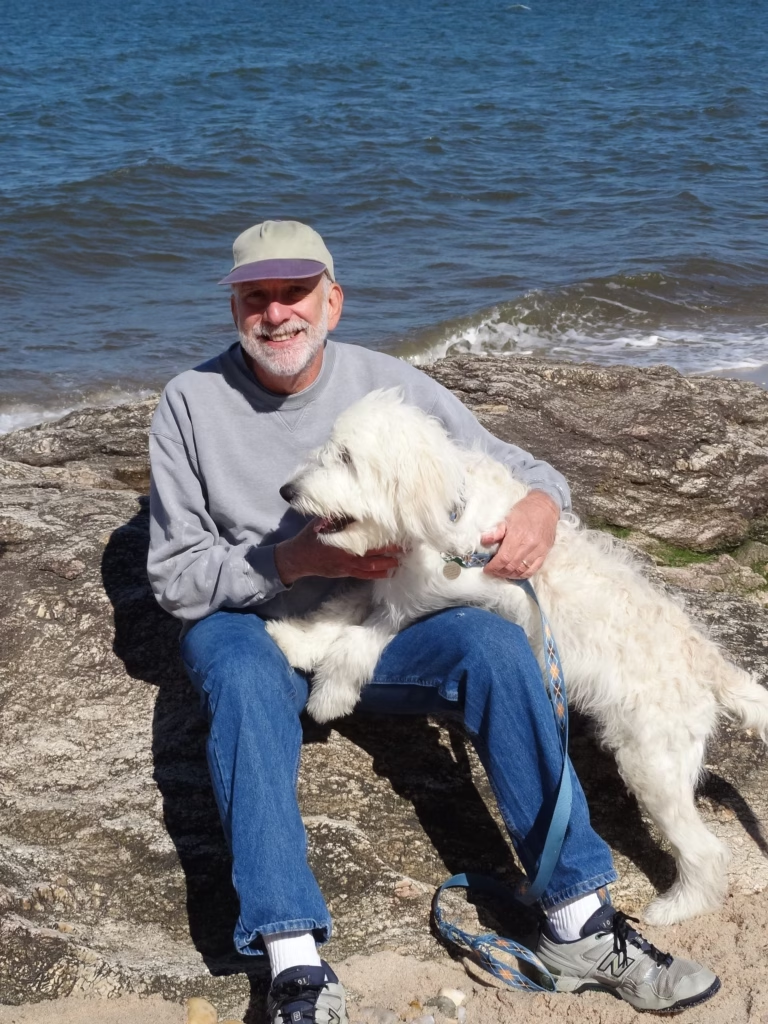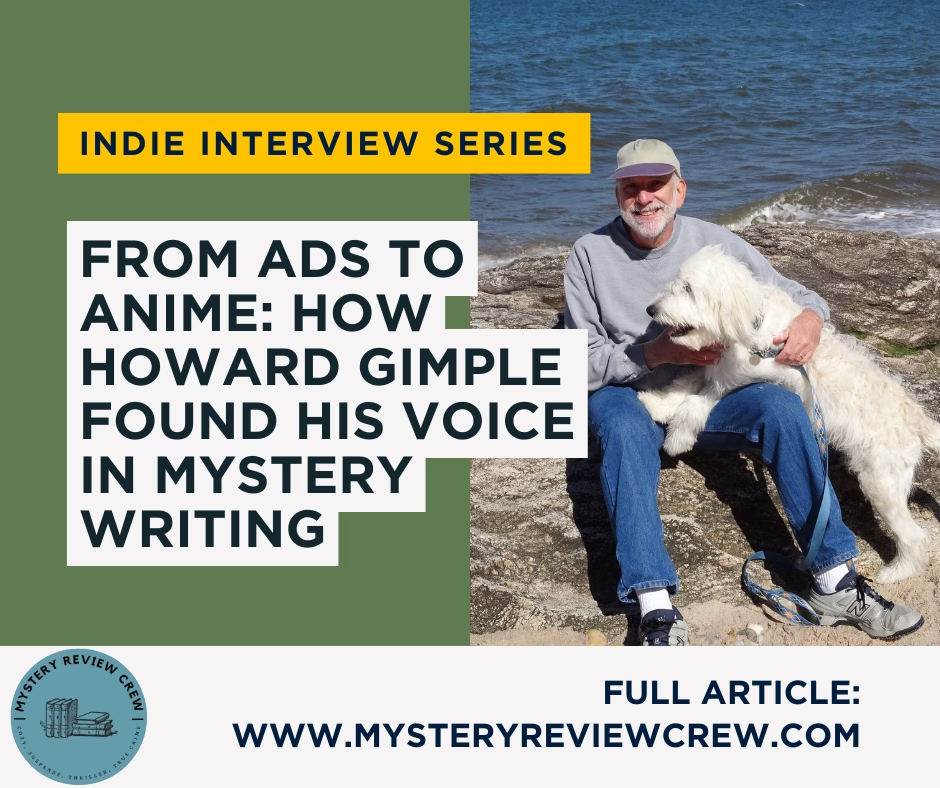This month, I had the privilege of interviewing an intriguing author new to me: Howard Gimple. From our email exchanges, his personality immediately captivated me, and the glowing praise from our review team about his books only heightened my excitement—coming from them, that’s the ultimate endorsement!
About Howard Gimple

Howard Gimple has been a penslinger for most of his adult life. He was a writer at Newsday, the editor of a newsletter for the New York Giants football team, and a copywriter and creative director for several New York ad agencies. He has written English dialogue for the American releases of Japanese anime cartoons and reviewed books for the Long Island History Journal and movies for a pay-per-view television network.
Howard was Chief Creative Officer at TajMania Entertainment, a film and TV production company dedicated to creating socially conscious programming. He wrote ’The Garbageman,’ an award-winning documentary about a waste management executive who helped save the lives of more than 50,000 children with congenital heart disease.
Howard was a writer and sports editor for the Stony Brook University alumni magazine. He also taught two seminars at the university, ‘Rock & Relevance,’ about the political influence of 60’s rock & roll and ‘Filthy Shakespeare,’ exploring the dramatic use of sexual puns and innuendos in the Bard’s plays and poems.
Obviously unable to hold a job for any length of time, Howard turned to writing novels, where his chances of getting fired are minimal.
Howard grew up in Brooklyn, which became cool shortly after he departed. He now lives in Glendora, California with his wife, Chris, and his goldendoodle, Brinkley.
Visit him at: https://howardgimple.com/

An Interview with Howard Gimple
You’ve had a diverse writing career—from journalism and advertising to anime and novel writing. How has your experience in those different fields influenced your storytelling in novels like Hard-Headed Woman and Get Gribnitz?
Having written in so many formats enables me to incorporate other disciplines into my stories. For example, Get Gribnitz features advertising and journalism in the story. In Hard Headed Woman, one of the character’s use (or misuse) of press releases leads to some interesting situations.
Can you share your journey to becoming an author? What inspired you to pursue a writing career?
Writing always came easily to me. I won a district-wide poetry contest in the sixth grade and never stopped writing. It never occurred to me that I could actually write for a living. It was only after getting horrible grades in most other subjects in college and A’s in English that I thought maybe I should see if I could make some kind of career out of this. After I graduated, I dated a girl who worked at an ad agency and it looked really cool, especially the writers and art directors who came to work in jeans and t-shirts when everybody else was wearing suits.
You’ve worked in socially conscious programming with TajMania Entertainment and wrote an award-winning documentary, The Garbageman. How do you incorporate social commentary into your fiction, if at all?
I try to subtly sneak some social commentary through my characters’ thoughts, ideas and conversations without getting preachy or pedantic. Probably my most socially conscious book is Where Love Means Nothing, where a major character is a half-Palestinian half-Israeli folksinger who is a peace activist.
Did you always know you wanted to be a writer, or did your passion for storytelling develop over time?
I believe my experience in advertising fine-tuned my storytelling chops. Ads and commercials are really very short stories that require a lot of discipline and creativity. Don DeLillo, Joseph Heller, Elmore Leonard and James Patterson, among others, started their writing careers as advertising copywriters.
What was the first story or piece of writing you remember creating? How has your writing evolved since then?
My high school, Erasmus Hall in Brooklyn had a big statue of the great Dutch philosopher, Desiderius Erasmus in the middle of the quad. My first story was how a group of kids decided to steal it as a prank and hide it in Prospect Park, where no one would notice it among all the other old statues there. That was my fledgling humorous adventure story and I’ve been trying to refine it ever since.
Your books often mix suspense, dark humor, and complex characters. How do you balance humor and thriller elements in your work, especially in a genre where the stakes are high, like murder and espionage?
Many of my favorite movies, Star Wars 4, 5, and 6, the Sean Connery James Bonds, Casablanca, Butch Cassidy, and the Sundance Kid, and many others mix high-stakes situations with humor to great effect. That is rarely done in fiction. Donald E. Westlake and Lawrence Block are two mystery writers who do it well. I would like to continue in their footsteps.
In Hard-Headed Woman, Hannah Johansson is determined to uncover the truth behind her father’s death. What inspired the idea of setting this mystery within a nature preserve, and how did the setting shape the story?
Hannah’s character is based on my wife, Chris, who actually did grow up on the Jamaica Bay Wildlife Refuge. Visiting there and speaking to her about what it was like growing up there was what gave me the idea for Hard Headed Woman.
Shakespeare’s Table tackles the enduring debate over the true authorship of Shakespeare’s works. What sparked your interest in this topic, and how did you approach blending historical intrigue with modern-day murder mystery?
I studied, then taught classes in Shakespeare at a university and the authorship question has always intrigued me. I think Dan Browns’s Robert Langdon stories do a masterful job at blending historical and modern mysteries. My challenge was to try to come somewhere close to that.
Do you have a favorite character that you’ve created? What makes this character particularly special to you?
Though I love all my characters, my favorite is Stew Gribnitz, from Get Gribnitz. He’s a very exaggerated version of a younger me.
What challenges did you face when you first started writing, and how did you overcome them?
As someone who spent most of his writing life penning ads, commercials, jingles, short videos, and magazine pieces, the largest of which was three pages, the prospect of writing a 300-odd page book seemed daunting, if not insurmountable. I just kept plugging away, going out on limbs, down dead ends and sometimes off a cliff, until I wound up with something that vaguely resembled a cohesive story. Not a very good story but at least one with a beginning, middle and end. That was a start.
Are you a planner or a “pantser” (writing by the seat of your pants)? How do you approach structuring your stories?
I’d call myself a ‘planser,’ sort of a combination of the two. I compare the process of writing to going on a cross-country trip. You have a starting point, a destination and a couple of key places you’d like to visit along the way. But many times the most interesting parts of the journey are the side-trips and surprise discoveries that you encounter along the way. And sometimes those side-trips can change the entire journey, which they often do in my stories.
Do you have a favorite genre or style to write in, or do you enjoy experimenting with different forms of storytelling?
So far most of my work has been in mysteries and adventures. I’ve been experimenting with different points of view in the books I’ve written. Right now I have a story in my head that would be more of a picaresque novel, a cross between Huckleberry Finn and On the Road, taking place in the late sixties.
What advice would you give to aspiring authors who are just starting their writing journey?
Keep writing and keep learning. There are many books, websites, videos and more about writing how-to’s and techniques. Some will work for you, some won’t. There’s no one specific way to write a novel. Find your way.Try not to react to every critique of your work. Think about what the feedback was, then decide if it’s valid.
Are there any exciting projects or new directions you’re planning to explore in your upcoming works?
Three projects I’m tinkering all have somewhat historical themes. One is a time-travel story where a student from the present meets Shakespeare, one is about trying to stop the Dodgers from leaving Brooklyn for L.A. and the novel I mentioned before about hitchhiking across the country in 1969, the year of Woodstock, Altamont and the first moon landing.
What do you hope readers take away from your stories? Is there a particular message or feeling you aim to convey?
My hope is that my readers come away from my stories entertained. That they enjoyed their time with me and my characters and consider the effort of reading 300-odd pages worth it.
My conversation with Howard Gimple was nothing short of fun. His unique perspective, rich storytelling, and dedication to crafting memorable characters have left me—and our review team—eager to read all his books. If you’re a fan of mystery, thriller, or a dash of humor in your reading, Howard’s work is bound to leave an impression. I hope this interview gave you a glimpse into the creative mind behind the stories. Don’t forget to check out his latest releases and let us know what you think!
Read one of Howard Gimple’s Books:
Howard Gimple, master of the comedy thriller, takes on the world of advertising in his funniest, snarkiest, most entertainingly irreverent book yet.
Stew Gribnitz is a brilliant advertising copywriter with impulse control issues, an utter disdain for authority and an unresolved demi-Oedipal complex (he’d like to murder his father but has no sexual designs on his mother). When the first act of his new creative director is to dump our hero’s best work into a garbage bin, Stew’s immediate impulse (which, of course, he can’t control) is to do unspeakable things to his new boss’s necktie while he’s still wearing it. The next day, when the necktie guy is found brutally murdered, Stew is brought in for questioning by the NYPD.
He’s released thanks to an air-tight alibi, but not before his face is emblazoned on the cover of the New York tabloids, declaring him to be a cross between Son of Sam and Jack the Ripper. Stew becomes a Madison Avenue untouchable and a New York City pariah, except to his father who declares that seeing his son on the front page of his favorite paper is the first time that Stew has ever done anything to make him proud.
Stew gets a gig as a part-time advertising consultant to a billionaire publisher running for Governor of Connecticut who’s twenty points behind in the polls. When the publisher’s private plane does a nosedive into Long Island Sound, Stew is the only one who knows that his deceased client had been receiving death threats from his opponent, a former FBI agent whose brother is a mob enforcer.
Stew is convinced he’ll be the next victim and the authorities are convinced he’s a multiple murderer. The only way to clear his name is to find the real killer or killers, a task, well beyond his skill set, made even more difficult because the FBI, the NYPD, several suburban police jurisdictions and a homicidal hitwoman are all out to GET GRIBNITZ.






